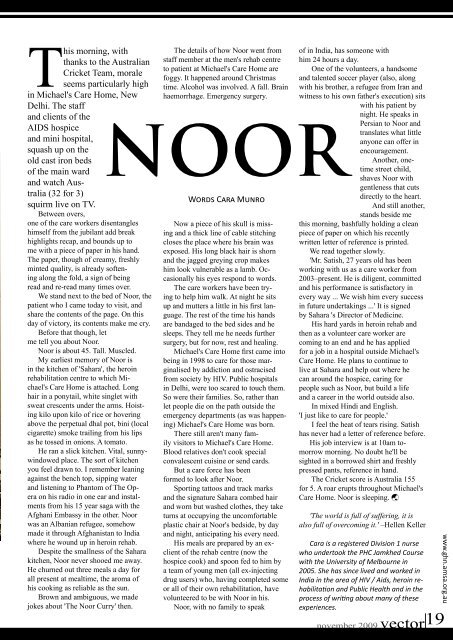You also want an ePaper? Increase the reach of your titles
YUMPU automatically turns print PDFs into web optimized ePapers that Google loves.
This morning, with<br />
thanks to the Australian<br />
Cricket Team, morale<br />
seems particularly high<br />
in Michael's Care Home, New<br />
Delhi. The staff<br />
and clients of the<br />
AIDS hospice<br />
and mini hospital,<br />
squash up on the<br />
old cast iron beds<br />
of the main ward<br />
and watch Australia<br />
(32 for 3)<br />
squirm live on TV.<br />
Between overs,<br />
one of the care workers disentangles<br />
himself from the jubilant add break<br />
highlights recap, and bounds up to<br />
me with a piece of paper in his hand.<br />
The paper, though of creamy, freshly<br />
minted quality, is already softening<br />
along the fold, a sign of being<br />
read and re-read many times over.<br />
We stand next to the bed of Noor, the<br />
patient who I came today to visit, and<br />
share the contents of the page. On this<br />
day of victory, its contents make me cry.<br />
Before that though, let<br />
me tell you about Noor.<br />
Noor is about 45. Tall. Muscled.<br />
My earliest memory of Noor is<br />
in the kitchen of 'Sahara', the heroin<br />
rehabilitation centre to which Michael's<br />
Care Home is attached. Long<br />
hair in a ponytail, white singlet with<br />
sweat crescents under the arms. Hoisting<br />
kilo upon kilo of rice or hovering<br />
above the perpetual dhal pot, bini (local<br />
cigarette) smoke trailing from his lips<br />
as he tossed in onions. A tomato.<br />
He ran a slick kitchen. Vital, sunnywindowed<br />
place. The sort of kitchen<br />
you feel drawn to. I remember leaning<br />
against the bench top, sipping water<br />
and listening to Phantom of The Opera<br />
on his radio in one ear and instalments<br />
from his 15 year saga with the<br />
Afghani Embassy in the other. Noor<br />
was an Albanian refugee, somehow<br />
made it through Afghanistan to India<br />
where he wound up in heroin rehab.<br />
Despite the smallness of the Sahara<br />
kitchen, Noor never shooed me away.<br />
He churned out three meals a day for<br />
all present at mealtime, the aroma of<br />
his cooking as reliable as the sun.<br />
Brown and ambiguous, we made<br />
jokes about 'The Noor Curry' then.<br />
The details of how Noor went from<br />
staff member at the men's rehab centre<br />
to patient at Michael's Care Home are<br />
foggy. It happened around Christmas<br />
time. Alcohol was involved. A fall. Brain<br />
haemorrhage. Emergency surgery.<br />
NOOR<br />
Words Cara Munro<br />
Now a piece of his skull is missing<br />
and a thick line of cable stitching<br />
closes the place where his brain was<br />
exposed. His long black hair is shorn<br />
and the jagged greying crop makes<br />
him look vulnerable as a lamb. Occasionally<br />
his eyes respond to words.<br />
The care workers have been trying<br />
to help him walk. At night he sits<br />
up and mutters a little in his first language.<br />
The rest of the time his hands<br />
are bandaged to the bed sides and he<br />
sleeps. They tell me he needs further<br />
surgery, but for now, rest and healing.<br />
Michael's Care Home first came into<br />
being in 1998 to care for those marginalised<br />
by addiction and ostracised<br />
from society by HIV. Public hospitals<br />
in Delhi, were too scared to touch them.<br />
So were their families. So, rather than<br />
let people die on the path outside the<br />
emergency departments (as was happening)<br />
Michael's Care Home was born.<br />
There still aren't many family<br />
visitors to Michael's Care Home.<br />
Blood relatives don't cook special<br />
convalescent cuisine or send cards.<br />
But a care force has been<br />
formed to look after Noor.<br />
Sporting tattoos and track marks<br />
and the signature Sahara combed hair<br />
and worn but washed clothes, they take<br />
turns at occupying the uncomfortable<br />
plastic chair at Noor's bedside, by day<br />
and night, anticipating his every need.<br />
His meals are prepared by an exclient<br />
of the rehab centre (now the<br />
hospice cook) and spoon fed to him by<br />
a team of young men (all ex-injecting<br />
drug users) who, having completed some<br />
or all of their own rehabilitation, have<br />
volunteered to be with Noor in his.<br />
Noor, with no family to speak<br />
of in India, has someone with<br />
him 24 hours a day.<br />
One of the volunteers, a handsome<br />
and talented soccer player (also, along<br />
with his brother, a refugee from Iran and<br />
witness to his own father's execution) sits<br />
with his patient by<br />
night. He speaks in<br />
Persian to Noor and<br />
translates what little<br />
anyone can offer in<br />
encouragement.<br />
Another, onetime<br />
street child,<br />
shaves Noor with<br />
gentleness that cuts<br />
directly to the heart.<br />
And still another,<br />
stands beside me<br />
this morning, bashfully holding a clean<br />
piece of paper on which his recently<br />
written letter of reference is printed.<br />
We read together slowly.<br />
'Mr. Satish, 27 years old has been<br />
working with us as a care worker from<br />
2003–present. He is diligent, committed<br />
and his performance is satisfactory in<br />
every way ... We wish him every success<br />
in future undertakings ...' It is signed<br />
by Sahara 's Director of Medicine.<br />
His hard yards in heroin rehab and<br />
then as a volunteer care worker are<br />
coming to an end and he has applied<br />
for a job in a hospital outside Michael's<br />
Care Home. He plans to continue to<br />
live at Sahara and help out where he<br />
can around the hospice, caring for<br />
people such as Noor, but build a life<br />
and a career in the world outside also.<br />
In mixed Hindi and English.<br />
'I just like to care for people.'<br />
I feel the heat of tears rising. Satish<br />
has never had a letter of reference before.<br />
His job interview is at <strong>10</strong>am tomorrow<br />
morning. No doubt he'll be<br />
sighted in a borrowed shirt and freshly<br />
pressed pants, reference in hand.<br />
The Cricket score is Australia 155<br />
for 5. A roar erupts throughout Michael's<br />
Care Home. Noor is sleeping. <br />
'The world is full of suffering, it is<br />
also full of overcoming it.' –Hellen Keller<br />
Cara is a registered Division 1 nurse<br />
who undertook the PHC Jamkhed Course<br />
with the University of Melbourne in<br />
2005. She has since lived and worked in<br />
India in the area of HIV / Aids, heroin rehabilitation<br />
and Public Health and in the<br />
process of writing about many of these<br />
experiences.<br />
november <strong>2009</strong> vector19<br />
www.ghn.amsa.org.au
















